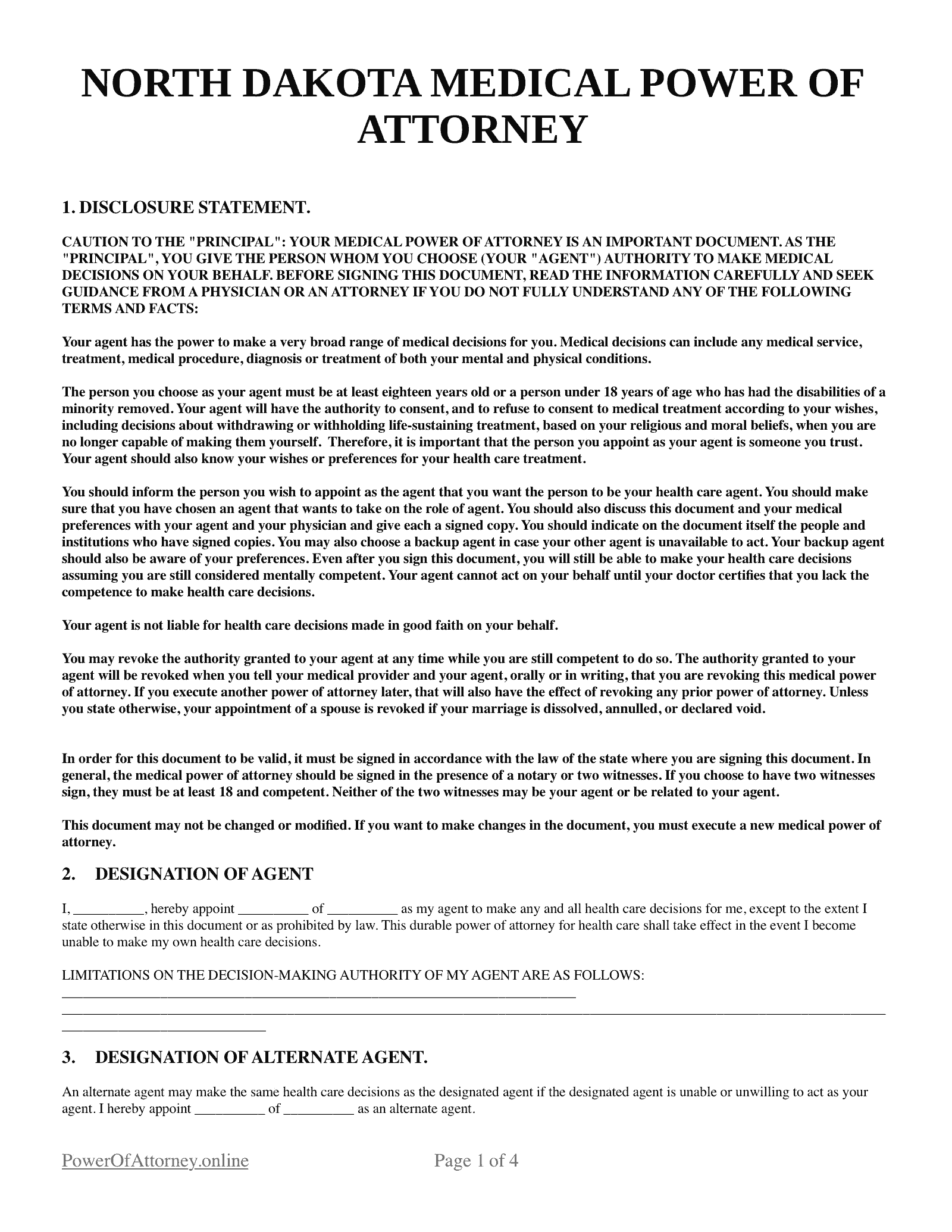Free North Dakota Medical Power of Attorney Forms
Healthcare is crucial, and people who have chronic diseases need continuous medication, treatment, and care. To ensure the continuation of medical care, one must sign a medical power of attorney (POA) form. It is a legal document that allows a person to appoint another as an agent, who will be responsible for making medical decisions on their behalf. The person who signs the document is called the principal.

North Dakota Medical Power of Attorney Laws
- Optional Healthcare Directive Form - The North Dakota Century Code provides a template for appointing a healthcare agent. It states, “If I have named a health care agent, these instructions are to be used by the agent. These instructions may also be used by my health care providers, others assisting with my health care, and my family, in the event I cannot make and communicate decisions for myself” (NDCC § 23-06.5-17).
- Healthcare Decisions - the agent, after consultation with the attending physician and healthcare providers, must make medical decisions based on the principal’s wishes and religious and moral beliefs. These can be stated verbally or implicitly in the healthcare directive. “If the principal’s wishes are unknown, in accordance with the agent’s assessment of the principal’s best interests” (NDCC § 23-06.5-03).
Signing Requirements in North Dakota
To be valid in North Dakota, the healthcare directive or POA must be signed by the principal and acknowledged by a notary public. Two adult witnesses will also suffice in place of a notary public. The agent can neither be the notarizing authority nor a witness to the POA. Any person related to the principal by blood or through marriage cannot be either the notary public or witness to the document.
How to Write a Medical POA in North Dakota
The healthcare directive acts as the agent’s permission to make decisions over a principal’s medical care, treatment, procedures, and end-of-life care. Here are the steps in creating one:
1. Choose an agent you can trust
A healthcare POA is obviously essential to preserving one’s life. You must choose a person that you can literally trust with your life. For many, it’s easy to choose someone they love–a spouse, child, sibling, or parent. A family member is a prudent choice because you know they care and want what’s best for you. However, some are not lucky enough to have family members they can trust.
The agent will make decisions for your medical treatment long after you have become mentally incompetent, which is why you need a trustworthy individual. The agent will also be responsible for deciding on your end-of-life care, so choose wisely.
2. Discuss your wishes with your agent
There comes a time when you eventually become mentally incapacitated and cannot make decisions on your own. But the decisions your agent makes should be based on what you want. Communicate your wishes to your agent. Better yet, include these wishes in the medical POA so they are documented.
Another issue you can discuss with the agent is compensation. It’s not common for healthcare directive agents to get compensation because they usually do it out of love for the principal. But it is still worth mentioning because agents can get compensation and refunds for their transportation and meals during their duties as agents.
3. Download the printable North Dakota Medical Power of Attorney Form
For your convenience, download a printable template for the medical POA in North Dakota. Fill it out with your personal information and wishes. Be as specific as you want to ensure that your every want is fulfilled even after you become mentally incapacitated.
4. Sign the Medical POA
Sign the document and write the date of signing. The document must be notarized or signed by at least two witnesses who are at least 18 years old. After the parties have signed, double-check that all pieces of information in the POA are correct.
5. Distribute copies and use the Medical POA
Now that the document is done keep a copy for yourself and distribute copies to significant parties, such as the agent, your family members, and healthcare providers. The agent must present the document every time they make decisions on your behalf.